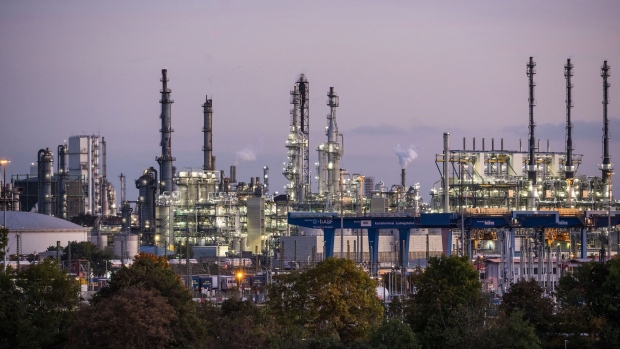Oct 26, 2022
BASF, Michelin Warnings Lay Bare Crippling Energy Woes
, Bloomberg News

(Bloomberg) -- European industrial leaders from French tiremaker Michelin to German chemical giant BASF SE are starting to crack under the weight of record energy and raw material prices, sending an ominous signal to the region’s broader economy.
Luxury-car maker Mercedes-Benz AG added to Michelin and BASF’s warnings on Wednesday about the outlook for Europe and the US, cutting its sales outlook for those regions as consumers face high inflation and rising interest rates.
“Investors have been worried about inflation effects for a long time but now this is really starting to come through in the numbers,” said Matteo Brancolini, a fund manager at BPER Banca in Milan. “It spells trouble for many companies in Europe as well as for consumers. There are more profit warnings to come.”
With no end in sight to Russia’s war in Ukraine, companies are heading into an uneasy winter where possible gas rationing as well as prohibitively high prices threaten to cut into production. And while many firms have successfully passed on higher costs to consumers, they’re now hitting limits as the worsening global economic outlook and soaring inflation cut into demand.
“Necessary price increases are happening only with a delay,” said Martin Moeller, co-head of Swiss and global portfolio management at Union Bancaire Privee. “So margins are under pressure.”
Wholesale gas and electricity prices have come down from summer records, after Europe scrambled to fill reserves and warmer than usual weather helped keep demand low. For industrials, though, energy prices are typically locked in months in advance, so any immediate reprieve is unlikely.
Michelin, BASF and Mercedes added to a growing list of companies sounding the alarm. German plastics maker Covestro AG on Tuesday cut its guidance after energy inflation and weakening demand weighed on profit. Volvo AB last week said high energy prices, combined with supply-chain disruptions and low freight capacity, hurt truckmaking returns.
Cie. Generale des Etablissements Michelin reaffirmed part of its guidance for this year, but cut its forecast for structural free cash flow to €700 million ($702 million) from €1.2 billion, mostly because of what Chief Financial Officer Yves Chapot called “hyperinflation” of costs for energy, raw materials and transport.
Chapot said Michelin’s expenditures will jump by as much as €2.6 billion this year. The company passed price increases onto automakers that buy its tires this year, though negotiations were long, the CFO said.
With the overall economic outlook uncertain, Michelin postponed its capital markets day initially planned for next month until March or April.
‘Permanently’ Changing
The comments echoed developments at BASF, Europe’s largest chemical maker and among the biggest corporate gas users, which said its natural-gas bill climbed by €2.2 billion in the first nine months of the year.
BASF, which reaffirmed its guidance for 2022, has countered surging costs by hiking prices and cutting utilization of its largest plant site in Ludwigshafen, Germany, Chief Executive Officer Martin Brudermueller said Wednesday. Earlier this month, the company said it plans to implement around €500 million in annual cost reductions via efficiency measures next year and in 2024.
Weak growth, energy inflation and stringent regulation “endanger the international competitiveness of European producers and force us to adapt our cost structures as quickly as possible and also permanently,” Brudermueller said.
While the outlook in Europe and the US has worsened, many firms are increasingly eyeing Asia to keep profits afloat.
Looking to China
Mercedes on Wednesday raised its expectations for a second time this year, saying significantly higher sales in China are offsetting declines elsewhere. At Mercedes’s main car division, returns climbed to 14.5% in the three months through September following a jump in deliveries.
BASF’s Brudermueller also said he still sees “good opportunities” in China, adding that business there is “very profitable.” The company plans to increase its China investments, said Brudermueller, who will join a high-level delegation traveling to China next month led by German Chancellor Olaf Scholz that also includes Volkswagen AG CEO Oliver Blume.
“We do not act naively on this,” Brudermueller said. “We ponder this thoroughly.”
(Updates with gas prices in sixth paragraph.)
©2022 Bloomberg L.P.


